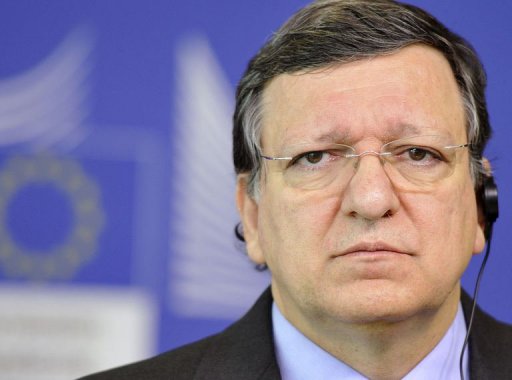Observe the European Commission long enough, and all you will see is confirmation of Abraham Kaplan’s 1964 law of the instrument: “Give a small boy a hammer, and he will find that everything he encounters needs pounding.”
In this case, the small boy is José Manuel Barroso, once a Maoist agitator, then the short-term prime minister of Portugal, and since 2004, the unelected president of the European Commission.
And it is the commission, the executive arm of the EU with sole power to initiate EU legislation and regulations, which is Barroso’s hammer.
Everything Barroso encounters needs a pounding with “more Europe.”
His obsession with finding problems he can “solve” with more EU regulations, committees, bigger EU budgets and greater powers for EU institutions was on show yet again on Thursday, when he spoke at a conference in Brussels.
Here is what Barroso he told his audience. Or rather, here is the problem Barroso “identified” and his solution to it:
European digital entrepreneurs are moving to Silicon Valley rather than set up their business in the EU. According to a report in Euractiv, Barroso said the reason so many Europeans were in the US tech capital was because it is a cultural environment encouraging innovation, new businesses and risk-taking.
“I was there not only with the big brands of Silicon Valley but the start-ups and the incubators of start-ups. I met so many Europeans there. One of the reasons they were there […] was precisely because of the general environment, the cultural environment in favour of innovation.”
Europe had to find out why young people are “attracted to other more dynamic places” for their careers, he said.
Note Barroso said “Europe” had to find out. That is his cue for more Brussels-directed research by either EU bodies already established and staffed by eurocrats who have never had a moment of business innovation in their lives, or by academics living on grants from the EU, or NGOs and think tanks that are funded by an EU institution, all to get together and produce useless reports in three years’ time entitled: “What do young entrepreneurs want?”
All of which is beside the fact that the answer to why young people are attracted to other more dynamic places is obvious: other places, almost all other places, are more dynamic than the aging, over-regulated, over-taxed, under-employed, early retirement, gone away for yet another holiday, countries of the EU, almost all of which, by the way, have fertility levels that guarantee the populations are heading for the vanishing point.
Which means Europe may one day not have Europeans, in the way Tuscany no longer has Etruscans. As a place for long-term investment, that trend marks the EU out as a loser. As a place for short-term dynamism, that marks the EU out as an old people’s home.
As the British Conservative MEP Daniel Hannan has pointed out: “When Britain joined the EU in 1973, western Europe (defined for these purposes as the 15 members of the EU prior to the 2004 enlargement round) accounted for 40% of world GDP.”
“Today that figure is 25%, and in 2020 it will be 18%.”
But that was not mentioned by Barroso. No, he has one instrument only, and it is EU law and regulation that exists to strike down anything that isn’t “Europe.”
So in this case, as in so many others, he claimed the problem of a weak “digital agenda”–the eurocrat’s plan to build economic growth in the EU through digital technology — was the barriers between member states’ national markets.
That is step one in Barroso’s solution, then. Take more powers away from national governments in the name of creating an “EU digital market.”
Yet the laws and regulations established by democratically-elected national parliaments are not the reason young entrepreneurs are getting out of the EU countries. Barroso’s solution is just yet another example of the Brussels unelected elite finding an excuse for less power for national parliaments and more power for themselves.
That is the law of the instrument at the European Commission. And that, in great part, is what is hammering to death growth and innovation in the EU.

COMMENTS
Please let us know if you're having issues with commenting.